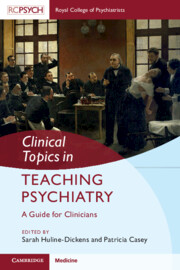Book contents
- Clinical Topics in Teaching Psychiatry
- Clinical Topics in Teaching Psychiatry
- Copyright page
- Dedication
- Contents
- Contributors
- A Note on the Cover
- Introduction
- Section 1 Teaching and Preparation
- Chapter 1 Improving Patient Care through Continuing Professional Development
- Chapter 2 The MRCPsych: Preparing Trainees and Improving Courses
- Chapter 3 Going Beyond ‘Good Enough’ Teaching in Psychiatric Training
- Chapter 4 A Guide to Conducting an Online Literature Search for Medical Educators
- Chapter 5 Writing for Learning and Publication
- Section 2 Teaching Methods
- Section 3 Feedback, Assessment and Supervision
- Section 4 Bridging the Gaps: Foundation Years and Interprofessional Education
- Section 5 Technologies Old and New
- Section 6 Supporting the Trainee in Difficulty
- Index
- References
Chapter 4 - A Guide to Conducting an Online Literature Search for Medical Educators
from Section 1 - Teaching and Preparation
Published online by Cambridge University Press: 24 November 2022
- Clinical Topics in Teaching Psychiatry
- Clinical Topics in Teaching Psychiatry
- Copyright page
- Dedication
- Contents
- Contributors
- A Note on the Cover
- Introduction
- Section 1 Teaching and Preparation
- Chapter 1 Improving Patient Care through Continuing Professional Development
- Chapter 2 The MRCPsych: Preparing Trainees and Improving Courses
- Chapter 3 Going Beyond ‘Good Enough’ Teaching in Psychiatric Training
- Chapter 4 A Guide to Conducting an Online Literature Search for Medical Educators
- Chapter 5 Writing for Learning and Publication
- Section 2 Teaching Methods
- Section 3 Feedback, Assessment and Supervision
- Section 4 Bridging the Gaps: Foundation Years and Interprofessional Education
- Section 5 Technologies Old and New
- Section 6 Supporting the Trainee in Difficulty
- Index
- References
Summary
Conducting a literature search can be a daunting experience. Most medical educators are in the difficult position of striving for a high-quality search while working in a busy academic and clinical environment.
The practice of research according to the principles of evidence-based medicine (EBM) has been perfected (i.e., has become richer and more complex) over the years, and the same goes for literature searching – an integral and key aspect of EBM (McKeever et al. 2015). However, the thought of dealing with an astonishing amount of literature (more than 55 million records only between the two major databases, PubMed/MEDLINE and Embase (Lefebvre et al. 2021)), would likely overwhelm even the most enthusiastic individual. The task of conducting a literature search thus often seems like a twofold burden that presents both psychological and practical barriers. In this chapter, we intend to lighten this burden by adopting an accessible language and approach.
- Type
- Chapter
- Information
- Clinical Topics in Teaching PsychiatryA Guide for Clinicians, pp. 41 - 54Publisher: Cambridge University PressPrint publication year: 2022



